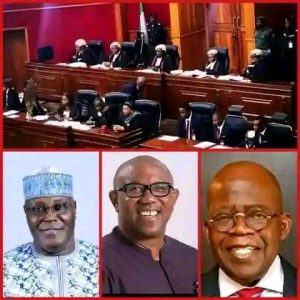
Ever since Nigeria switched to democracy in 1999, the nation’s elections have been characterized with misconduct and voting buying.
From 1999, 2003, 2007 to 2011 and 2019, only the 2015 presidential election result escaped contestation in court in the Nigerian fourth republic.
The recent heat of challenging elections outcome in Nigeria came few months ago, when Atiku Abubakar, the presidential candidate of the Peoples Democratic Party (PDP), and Peter Obi of the Labour Party (LP) challenged the February 25th polls that made Bola Ahmed Tinubu of the All Progressives Congress (APC), the president of Nigeria.
Both the PDP candidate, Atiku Abubakar and LP Candidate, Peter Obi rejected the result, accusing the Independent National Electoral Commission(INEC) of gross misconduct in the electoral process.
Atiku Abubakar’s rejection of the result was followed by a PDP protest led at INEC’s headquarters in Abuja, and subsequently filed a lawsuit against INEC in Court of Appeal, asking that his lawyers be allowed to inspect sensitive electoral materials used for the exercise.
Peter Obi also did the same.
Meanwhile, as noted earlier, challenging election outcomes in court in Nigeria is not a new trend. In 1999, the first election since return to democracy, Olu Falae, the candidate of Alliance for Democracy (AD), contested the February 27 election against Olusegun Obasanjo, the candidate of Peoples Democratic Party (PDP) who was declared winner by INEC.
Obasanjo was said to have polled a total 18,738,154 votes to defeat Falae who got 11,110,287. But in March, Falae filed a suit at the Court of Appeal against INEC, challenging the outcome of the result.
In the end, the court of appeal struck out his application based on technicalities, and affirmed the declaration of Obasanjo.
Also, Muhammadu Buhari, the candidate of the All Nigeria Peoples Party (ANPP) challenged the outcome of the 2003 presidential election against Olusegun Obasanjo, the candidate of PDP.
Obasanjo polled 24,456,140 votes while Buhari got 12,710,022 votes, but the latter, dissatisfied with the result, staged a suit at the Petition Tribunal sitting in Abuja.
After a protracted legal battle lasting till 2005, the Supreme Court affirmed the judgment of the Tribunal and dismissed Buhari’s application.
The outcome of the 2007 presidential election also witnessed a legal tussle involving Umaru Musa Yar’Adua of the PDP who won the race after defeating Muhammadu Buhari of the ANPP and Atiku Abubakar of the Action Congress of Nigeria (ACN).
However, in November 2008, the Supreme Court upheld the election of Yar’Adua into office as president.
Moving forward, in 2011, Muhammadu Buhari of the Congress for Progressive Change (CPC) and Nuhu Ribadu of the (ACN) challenged the outcome of the April poll after Goodluck Jonathan, the candidate of PDP was declared winner by INEC.
Following a protracted legal tussle at the Court of Appeal, the Supreme Court affirmed the decision of the latter court, and upheld the victory of Goodluck Jonathan.
Only the 2015 elections, which brought Muhammadu Buhari of APC to power, evaded a legal contestation. In 2019, Atiku Abubakar of PDP rejected the outcome of the February poll, challenging the result in court asking the declaration of Muhammadu Buhari of APC be annulled.
Atiku’s application was dismissed by all the courts he sought help from.
Now that the 2023 Issue is also
Settled, What Next?
The Nigerian Court of Appeal had given its verdict on the legal tussle involving president Bola Ahmed Tinubu and Atiku Abubakar of PDP and Peter Obi of LP.
The appeal court, on 6th September 2023, dismissed all the claims made by LP’s candidate, Peter Obi against president Tinubu for lack of evidence. Atiku’s claims as well could not survive the acid of evidence.
What now comes after the Nigerian election tribunal’s verdict that went in favor of president Tinubu?
For one, the president cannot have the privilege of enjoying a long honeymoon, not even when the economy of the country still remains in a sorry state with over 21% headline and food inflation.
By allowing free flow of the market and allowing private institutions to thrive without too many restrictions, the government of Tinubu needs to salvage the economy of the country from the shackles of retarded growth.
Also, the government, by investing in private institutions, needs to create more job opportunities to tackle the unemployment rate of over 40%, according to the National Bureau of Statistics (NBS).
In order to create a conducive environment for trade and all human related activities to thrive in the country, the persisting insecurity needs to be curtailed.
Nigeria was the third worst country with insecurity in the world in 2020, according to the Global Terrorism Index (GTI). Even though there seems to be a little respite in 2022 as GTI placed the West African country on six and eight positions respectively, the Tinubu-led administration has to proactively address the menace of the insecurity in the country.
